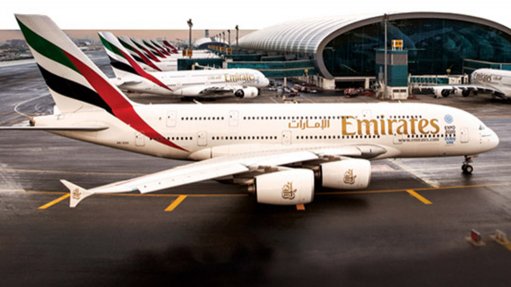
Emirates’ A380 Superjumbos at Dubai International Airport
Photo by: Emirates
Major international airline Emirates, based in Dubai, on Wednesday reintroduced the Airbus A380 Superjumbo on to its Dubai-Johannesburg route, to meet growing passenger demand. Previously, the airline had operated the A380 on its Johannesburg route for a few months in 2011/2012, but the market had not proved mature enough and the type was more needed on other routes. “This time, it’s going to stay!” assured Emirates senior VP: commercial operations Africa Orhan Abbas.
Johannesburg is now the airline’s busiest route in Africa, with four flights daily; until now, they have been operated by Boeing 777-300ER aircraft. From today, one of these daily schedules will be flown by an A380. Emirates is the world’s biggest operator of the Superjumbo, with 92 in service and another 50 on order.
Over the past five years the airline has seen its passenger numbers on the Johannesburg route increase by 47%. Abbas is confident that the increased capacity of the A380 will stimulate further growth in traffic on the route. Emirates’ A380s are fitted with 14 “private suites” in first class, 76 “mini pods” with lie-flat seats in business class and 426 “spacious seats” in economy class.
South Africa is the company’s largest market in Africa, although other important continental markets are Egypt, Kenya and Morocco. The airline operates eight flights a day between South Africa and Dubai. In addition to the four to Johannesburg, there are three to Cape Town and one to Durban.
Although there have been declines in traffic on some other routes, this does not apply to South Africa. “In South Africa … we see the growth coming in. … [H]ere, we do not see any slowdown,” affirmed Abbas, who pointed out that the country also acted as a regional hub for Southern Africa.
The growth is being driven 70% by the leisure market and 30% by the business market. “A lot of leisure [traffic] is coming in, the currency [exchange rate] is very attractive, a lot of dollar-country [holiday] business is coming in,” he explained. “The leisure traffic is growing massively into South Africa.” Moreover, increasing numbers of South African tourists are going to Dubai.